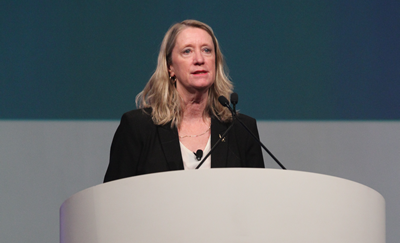Everett to Center Presidency on Innovative Solutions to Expanding Care, Increasing Support to Members

“Keep the engagement going, and don’t drop the connections you make at the Annual Meeting,” urged APA President-elect Anita Everett, M.D., in her speech tonight at the Opening Session. She also exhorted meeting attendees to step up their involvement with an APA that is growing in numbers and influence.
“I encourage each of you to take just one more step to deepen your involvement with APA,” Everett said. “It could be as simple as following APA’s accounts on social media or taking one of the free member courses available each month. You could get more involved with your district branch or sign up to join the next phase of the PsychPRO registry. And if you aren’t already a member of APA, your next step could be stopping in the Exhibit Hall this week to learn about the benefits of membership.”
Everett told her colleagues APA exists to help them meet their aspirations. She outlined her own aspirations and goals for her upcoming presidential year, emphasizing three items in particular—the development of innovative systems for improving access to care, team-based care for first-episode psychosis, and initiatives regarding physician wellness and burnout.
Referencing the serious shortage of general psychiatrists and child and adolescent psychiatrists, Everett said it will require innovative systems and technologies—such as integrated care models and telepsychiatry—to extend psychiatric expertise to patients who won’t otherwise receive care. To organize and advise APA’s Board of Trustees on innovations and aspirations, she has appointed the Work Group on Access to Treatment Through Innovation.
A community psychiatrist deeply committed to the needs of patients in public systems, Everett hailed the work of APA’s public psychiatrists. “I have appointed many leaders in community and public psychiatry to positions throughout our APA,” she said. “Good community psychiatrists are systems thinkers and gravitate toward working in team-based settings to address the circumstances, treatment, and recovery support of our most seriously ill. All of these advances give me great hope that we can improve access to mental health care and provide more effective care to the people to come to see us.”
First-episode psychosis is an area that has garnered attention as a sentinel event where timely intervention can be critical. Right now, she said, the gap between a first episode and the start of treatment is an average of eight years. “That’s far too long, and we can and must do better,” she said. “Team-based models that provide treatment early to young adults will help us shorten the time between symptom onset and treatment. The promise here is the opportunity to keep kids on or near the life trajectory they would have had. In my year as president, I plan to work with our Council on Children, Adolescents, and Their Families to identify gaps for psychiatry that our organization can address so that adult and child psychiatrists are equipped to provide the best evidence-based care to patients at this critical juncture.”
Everett also promised to make physician wellness and physician burnout a priority. “More than half of physicians in the United States report feeling at least one symptom of burnout, with emotional exhaustion topping the list,” she said. “Most of us right here in this room have felt, at the very least, some degree of compassion fatigue and, at most, have experienced deep and pervasive episodes of burnout in our careers as psychiatrists. … We need to assure that employed physicians, and especially those in community mental health centers, have jobs that are generative, meaningful, and valued.”
Richard Summers, M.D., psychiatry training director at the University of Pennsylvania, chairs a work group on physician burnout appointed by Everett. “By the end of the year, we hope to have tools and resources to share with all of you on this important issue.”
Everett closed by urging psychiatrists at the meeting to dream big. “Become what you aspired to be. You can make a difference, and I hope that in my term as president I can initiate a few things that enhance your professional lives, too. This is an exciting time for psychiatry, and I can't wait to see what we can accomplish together.”
(Image: David Hathcox)
|
|
|
|
|


